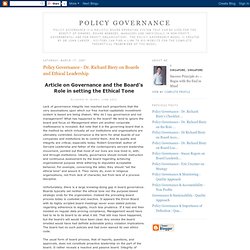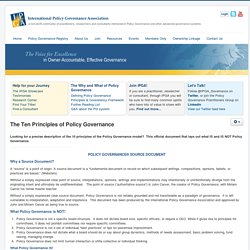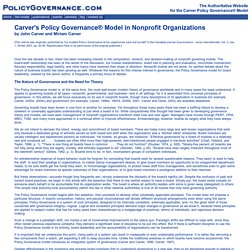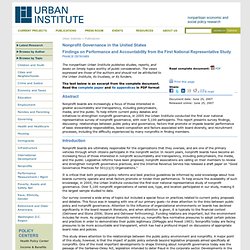

Policy Governance - Dr. Richard Biery on Boards and Ethical Leadership. Lack of governance integrity has reached such proportions that the very assumptions upon which our free market capitalistic investment system is based are being shaken.

Why do I say governance and not management? What has happened to the board? We tend to ignore the board and focus on Management when yet another corporate malfeasance is revealed. But note that it is the governing board that is the method by which virtually all our institutions and organizations are ultimately controlled. Governance is the term for what boards of our companies and institutions do to control them. Unfortunately, there is a large knowing-doing gap in board governance. The usual form of board process, that of reports, questions, and approvals, does not constitute proactive leadership on the part of the board. To achieve and assure governance integrity trustees must be trained in governance. International Policy Governance Association (IPGA) The Ten Principles of Policy Governance. Looking for a precise description of the 10 principles of the Policy Governance model?

This official document that lays out what IS and IS NOT Policy Governance. Why a Source Document? A “source” is a point of origin. A source document is a “fundamental document or record on which subsequent writings, compositions, opinions, beliefs, or practices are based.” (Websters) Without a simply expressed clear point of source, interpretations, opinions, writings and implementations may intentionally or unintentionally diverge from the originating intent and ultimately be undifferentiated.
Without a simply expressed clear source document, Policy Governance is not reliably grounded and not transferable as a paradigm of governance. What Policy Governance is NOT! Policy Governance is not a specific board structure. What Policy Governance IS! Principles of Policy Governance 1. 2. 3. 4. 5. 6. 7. 8. 9. 10. All other practices, documents, and disciplines must be consistent with the above principles. Welcome to PolicyGovernance.com. The Policy Governance® Model. [This article was originally published as "Le modèle Policy Governance et les organismes sans but lucratif" in the Canadian journal Gouvernance - revue internationale, Vol. 2, nos. 1, Winter 2001, pp. 30-48.

Republication here is by permission of the original publisher.] Over the last decade or two, there has been increasing interest in the composition, conduct, and decision-making of nonprofit governing boards. The board-staff relationship has been at the center of the discussion, but trustee characteristics, board role in planning and evaluation, committee involvement, fiduciary responsibility, legal liability, and other topics have received their share of attention. Nonprofit boards are not alone, for spirited debate about the nature of business boards has been growing as well. Whatever the reasons for this intense interest in governance, the Policy Governance model for board leadership, created by the senior author, is frequently a primary focus of debate. What is there to control?
Nonprofit Governance in the United States: Findings on Performance and Accountability from the First National Representative Study. The nonpartisan Urban Institute publishes studies, reports, and books on timely topics worthy of public consideration.

The views expressed are those of the authors and should not be attributed to the Urban Institute, its trustees, or its funders. The text below is an excerpt from the complete document. Read the complete paper and its appendices in PDF format Abstract Nonprofit boards are increasingly a focus of those interested in greater accountability and transparency, including policymakers, media, and the public. Introduction Nonprofit boards are ultimately responsible for the organizations that they oversee, and are one of the primary vehicles through which citizens participate in the nonprofit sector. It is critical that both proposed policy reforms and best practice guidelines be informed by solid knowledge about how boards currently operate and what factors promote or hinder their performance.
As rich as these data are, keep in mind that these data come from self-reports. Testing the Implementation, Board Performance, and Organizational Effectiveness of the Policy Governance Model in Nonprofit Boards of Directors.